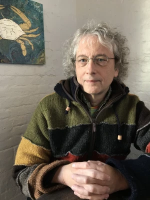Students on the campus of Goucher College may one day need to make room for seniors riding in golf carts. Officials with Goucher College and Edenwald Senior Living Community in Towson are hashing out plans for retirees to live on the college campus. This would be the first arrangement of its kind in Maryland.
Martha Weiman has lived at Edenwald for three years and she’s excited about the idea of a retirement community on the university grounds for the intergenerational learning exchange.
“I’m hoping it won’t be a hard sell but you know there are some older people who are so rigid,” Weiman said. “But there are those of us who really think it’s a great idea. And I think it keeps you young dealing with younger people and the young people have a lot to learn from us older people.”
While there are about 2,000 retirement communities nationwide, fewer than 100 of them share a footprint with universities, said Mark Beggs, CEO of Edenwald.
The Towson senior community building already sits adjacent to Goucher College’s campus. The goal is to expand the existing building across three acres on the college campus which would connect the two institutions, Beggs said.
Often, retirement communities are full service islands and don’t require residents to leave for any basic needs, he said.
“We have restaurants, beauty shops, gyms, banks,” Beggs said. “People could move into a community like this and never leave the property. That’s not what they want anymore.”
Seniors are more interested in cultural events like concerts and plays which are often hosted at the college. They might want to take some college classes or even tap into the university’s study abroad program.
Even some college faculty members could live in the senior community apartment for free. In exchange, the professors would run programs for the residents. Students could get internships and jobs with Edenwald.
Psychology is the most popular major on campus, said Kent Devereaux, president of Goucher College. Other majors like chemistry and biology also lend themselves to students winding up in healthcare, he said.
“They understand that there’s a lot of needs that are going to have to be met in future years in health care, in mental health,” Devereaux said. “Being able to then have an opportunity to engage with an older population, to understand what their needs are, the way they think, is I think exciting for many of our students.”
This is a case of both Goucher and Edenwald dealing with changing demographics.
Devereaux said, “As we look out 20 years from now and say gee, we are just going to have a smaller high school graduating population nationwide. And at the same time we’re going to have a much larger percentage of the population that is over 65 [years old].”
Devereaux added while staying financially viable is a factor, “Staying relevant to society is the bigger picture.”
Baltimore County Republican Councilman David Marks proposed legislation to the county council that will allow the plan to go forward.
“Baltimore County has a senior population that’s exceeding 25%,” Marks said. “Our elderly population is going to continue to grow and this is the type of campus that I think really attracts seniors and promotes a culture of lifelong learning.”
But some of those seniors may come from far beyond the Baltimore area. Part of the marketing strategy would be reaching out to Goucher alumni about returning to campus. Edenwald already surveyed Goucher alums about it.
“30% of Goucher alumni who live more than 250 miles away are interested in moving to a community like this,” Beggs said. “That’s unheard of. I think there’s an affinity for those of us as we get older, that if we have an interest in re-living any experience in our life, it tends to go back to college.”
Edenwald wants to lease three acres on the Goucher campus. That property currently has trees on it, so Councilman Marks said Goucher may have to pay a fee in order to waive the county’s requirements for developers to preserve green space.
“Initially we thought Goucher College has a lot of fields and woods, and they would meet the open space requirements,” Marks said. “When all is said and done, Goucher College was willing to pay if they need to and certainly satisfy those requirements.”
While nothing is final, Edenwald is considering putting three high rises on the property that would have 127 apartments. If all goes well with financing and the like, Beggs said they would start building the towers in 2025.
He said one way the seniors would get around on campus is by riding in golf carts instead of walking.
“We’ll have golf carts that will take people to different amenities across the campus,” Beggs said. “That’ll just be a part of what we do.”
Goucher freshman Clara Phelps said she would be cool with that.
“That would be fun,” Phelps said. “Maybe I could hitch a ride or something.”
Zoe Brier, who is a junior majoring in psychology, said she worked with seniors when she was in high school and learned a lot from them. But she added it’s important that there is a campus wide discussion about the university-based retirement idea.
“I do worry since there are party cultures on campus,” Brier said. “I don’t know if they would like the culture in that sense.”
Edenwald’s CEO said the seniors would be far removed from student housing and that they do plan to survey Goucher students to take their temperature about sharing the campus.
Both Goucher and Edenwald have long histories.
Edenwald traces its history back to 1881. Around 400 people live there.
Goucher was founded in 1885. It is a small, private college of 2,000 students, who are almost evenly split between its undergraduate and graduate schools.
“We’re not going anywhere,” Devereaux said. “We just want to lay a solid foundation for both of our organizations to work together and develop something really unique.”







